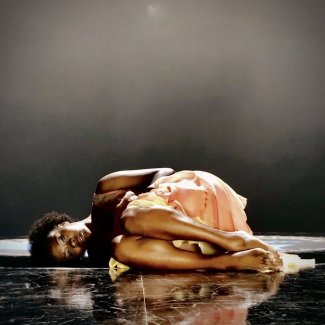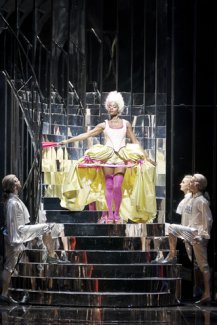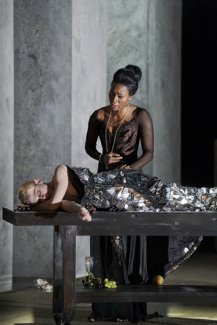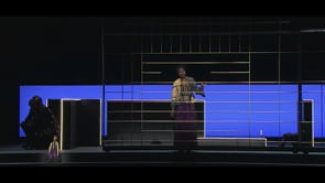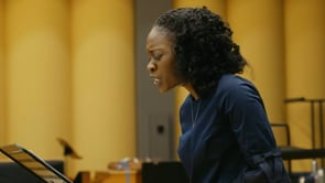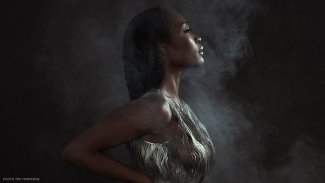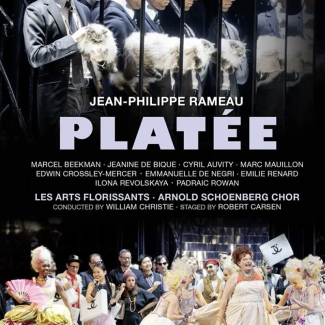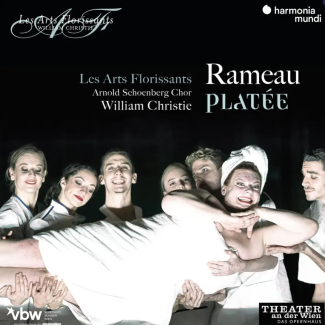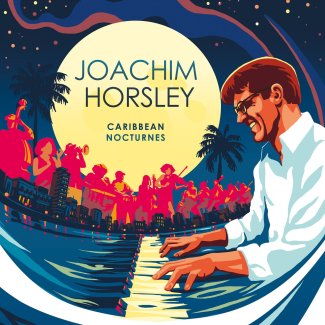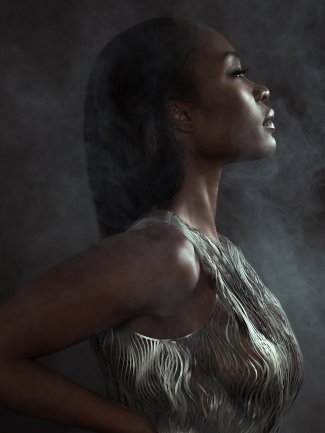

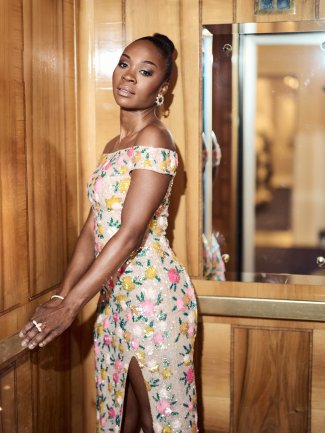
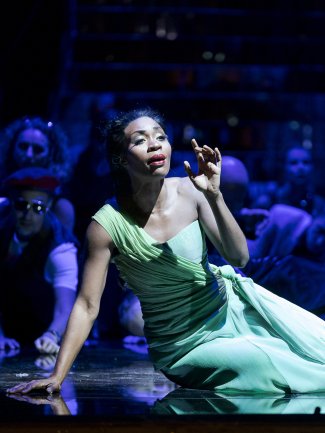
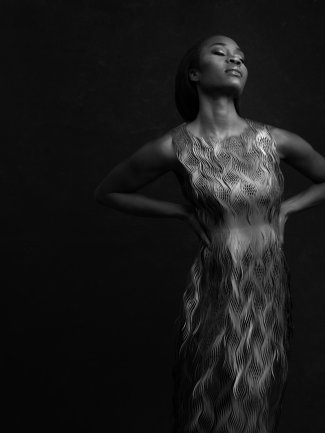
Jeanine De Bique
Download Assets
“De Bique shines and impresses with the beauty of her timbre, the perfect mastery of her instrument, the sensitive emotion of her characterization…”
Classique News, November 2022
The inspirational Trinidadian soprano Jeanine De Bique has captivated audiences around the globe with flawless technique, sparkling coloratura and profoundly moving, dramatically astute performances. Blessed with a musical versatility that lets her shine equally brightly in baroque, classical and contemporary roles, De Bique brings a unique authenticity to the stage and has firmly secured her international position as one of the most exceptional sopranos of her generation.
Highlights of the 2024/25 season include Télaïre in Rameau’s Castor et Pollux for Opéra National de Paris in Peter Sellars’ new staging under Teodor Currentzis and reprised in concert at the Salzburger Festspiele, and Le lacrime di Eros, a Baroque pastiche featuring works by Caccini, Peri and Monteverdi, arranged and conducted by Raphaël Pichon and directed by Romeo Castellucci for Dutch National Opera. Marking her anticipated role debut as Violetta (La traviata), De Bique returns to both Gran Théâtre de Genève under Paolo Carignani, and Staatsoper Unter den Linden under Jérémie Rhorer. On the concert platform, De Bique makes her debut with the Royal Concertgebouw Orchestra in St Matthew Passion under Riccardo Minasi, sings Mahler’s Symphony No.4 with Staatskapelle Berlin conducted by Simone Young, Messiah with the Handel and Haydn Society conducted by Jonathan Cohen, and Messiah and Faure’s Requiem with the Pittsburgh Symphony Orchestra under the baton of Manfred Honeck. In recital, De Bique can be heard at Kölner Philharmonie with pianist Aaron Wajnberg, at Concertgebouw Amsterdam with Maarten Engletjes and PRJCT Amsterdam, and with the Philadelphia Chamber Music Society with pianist Warren Jones. Elsewhere De Bique continues to tour her critically acclaimed debut album Mirrors with Concerto Köln at Bozar, Brussels, Konzerthaus Berlin and Philharmonie Essen.
See More
Jeanine De Bique’s debut solo album and tour-de-force exploration of Baroque’s greatest heroines, Mirrors, was released by Berlin Classics in 2021 with her ‘dazzling virtuosity’ (Gramophone) rewarded with the 2022 Opus Klassik Award for Best Vocal Solo Recording, a Diapason d’Or, the Edison Klassiek Award, and Editor’s Choice plaudits in Gramophone, Fono Forum, and Opera Magazine.
On the opera stage, Jeanine De Bique has met with unanimous acclaim for her baroque interpretations of Alcina in Robert Carsen’s production for Opéra National de Paris (Thomas Hengelbrock), Rodelinda in Jean Bellorini’s new production for Opéra de Lille (Emmanuelle Haïm, released on DVD and winner of Opus Klassik Award 2020), La Folie in Rameau’s Platée for both Theater an der Wien and Gran Teatre del Liceu under William Christie, and the title role in L’incoronazione di Poppea for Gran Théâtre de Genève (Ivan Fischer). Mozart’s leading ladies have also significantly contributed to De Bique’s successes: as Donna Anna (Don Giovanni) for Staatsoper Unter den Linden (Marc Minkowski) and Opéra National du Rhin (Christian Curnyn), Susanna (Le nozze di Figaro) for Opéra National de Paris (Louis Langrée) and for San Francisco Opera (Henrik Nánási), and Annio (La clemenza di Tito) in Peter Sellars’ iconic production for the Salzburg Festival, Deutsche Oper Berlin and Dutch National Opera under Teodor Currentzis.
In recent seasons, De Bique’s musical versatility has led to remarkable debuts as Cendrillon for Opéra national de Paris (Keri-Lynn Wilson), Micaëla (Carmen) for Gran Teatre del Liceu (Josep Pons), Anaï in Tobias Kratzer’s production of Rossini’s Moïse et Pharaon (Michele Mariotti) for Festival d’Aix en Provence, Agathe (Der Freischütz) at Konzerthaus Berlin (Christoph Eschenbach), Helena in Ted Huffman’s production of A Midsummer Night’s Dream for Deutsche Oper Berlin (Donald Runnicles) and the world premiere of Hamel’s Causo a Cuba for Dutch National Opera (Otto Tausk) and Isabel in Benjamin’s Lessons in Love and Violence for Opernhaus Zürich under Ilan Volkov.
The driving force behind a trailblazing new programme, Carnival Baroque, a fusion of Baroque arias and Caribbean folk songs, Jeanine De Bique has toured across Europe with Holland Baroque. On the concert stage, her varied repertoire includes works by Mahler, Brahms, Beethoven, Mozart, and Schumann and has brought performances at the BBC Proms with London Symphony Orchestra and Sir Simon Rattle, with Wiener Philharmoniker under Herbert Blomstedt, Los Angeles Philharmonic with Gustavo Dudamel, Pittsburgh Symphony Orchestra and Manfred Honeck, among many others. A sought-after recitalist, De Bique has appeared extensively both in Europe and North America, including in New York at both Carnegie Hall and at Lincoln Centre as part of their Mostly Mozart Festival.
De Bique’s wider discography includes Mahler’s Symphony No.8 with New York Philharmonic Orchestra under the late Lorin Maazel, Rameau’s Platée with Les Arts Florissants and William Christie on CD and DVD (Harmonia Mundi and Unitel), Handel’s Rodelinda with Le Concert d’Astrée and Emmanuelle Haïm on DVD (Erato), winner of Opus Klassik Award 2020, and she features on Joachim Horsely’s Caribbean Nocturnes as guest soloist on the song Le M’mouri (LA Café). De Bique holds a master’s degree from Manhattan School of Music, is a recipient of the Youth Ambassador for Peace, awarded by the National Commission of UNESCO, Trinidad and Tobago, and is a Bärenreiter Jubilee Ambassador.
Contacts
Shirley Thomson Senior Director, VOICE at HarrisonParrott | Head of CSR
General Management
General Management
“Jeanine De Bique, the discovery of the evening, impresses with her vocal presence and technical assurance. Her Violetta does not come across as sentimental, but rather resolute and internally stable.”
“Jeanine De Bique’s beautiful Télaïre, is a crystalline, highly elastic voice, with such delicate, skin-deep nuances, singing of extreme pain with extreme gentleness (especially the‘Tristes apprêts’)“.
“the singer captivates the audience with the beauty of her timbre, the plasticity of her singing line, her noble stature and her commitment to the role of Télaïre.”
“the soprano Jeanine de Bique showed off her considerable vocal capacities…The voice’s velvety timbre adds a dose of air to the strings…proof of a technical mastery coloured by a sensitivity just beneath the skin… Elsewhere, the Trinidadian soprano’s distinctive grain is extended by a skilful blend of vibrato and tension, to which is added a dramatic intensity that makes her a powerful tragedienne, particularly when she sings in direct address to the audience. Her gaze accompanies every inflection of her voice, creating a powerful impression.”
“…the stratospheric Jeanine De Bique (Télaïre), in perfect communion with the pit, offers a lesson in singing in which every utterance is a form of sonic subtraction, once again towards silence. In the final notes of the aria, the orchestral voice can no longer be distinguished from the human voice. In the rest of the work, she will shine through the humility of her vocal and stage presence.”
“Jeanine De Bique, the Trinidadian queen of this night… possesses a radiant presence and sparkling, celestial timbre, She created pure magic in the third part “I know that my redeemer liveth” and in everything else she sang.”
“vocal haute couture.”
“Jeanine De Bique not only sang, she embodied the roles, she suffered and trembled, rejoiced and triumphed… A celebration of expressiveness!”
“…it was Jeanine De Bique as Donna Anna who stole the spotlight, captivating audiences with her flawless portrayal of the character. De Bique’s interpretation was hailed as the highlight of the evening.”
“Jeanine de Bique offers us a memorable interpretation of Cinderella. We heard an extraordinary artist, endowed with an extremely rich timbre and a wide vocality with powerful emission, easily changing register but also capable of surpassing the nuances desired by the composer. Both funny and moving, she radiates the stage with her charisma and her great ease of movement.”
“Jeanine De Bique in the role of Cinderella is overwhelmingly lyric in her expressive singing, as in her aria in the first act “Reste au foyer, petit grillon “, a jewel of resigned melancholy, or in the many duets and ensembles.”
“In the title role, Jeanine De Bique enchants with her rich, bright timbre, combining lightness in the high notes as well as power in her most lyrical arias”
“From the finest piano with a perfect tone to the change to her chest voice — there seem to be no limits”
“Jeanine De Bique creates this woman of pain, for long stretches in silence, by virtue of her stage presence. The Trinidad-born soprano, however, shapes the arioso moments with enormous vocal clarity and creative power, Purcell’s baroque songs become reflections of the soul of a woman who is entirely contemporary and her story of suffering. The climax of this appropriation is “They tell us”, dimmed down from screaming lamentation to literally dying Sotto Voce. No one in the sold-out Felsenreitschule dared to breathe”
“She has her voice brilliantly under control both in the warm middle register and in radiant heights. Everything is on point.”
“Jeanine De Bique, a darkly timbred soprano who captures the deep seriousness of the situation in voice and acting, is the highlight of the evening.”
“In its history, the Göttingen Handel Festival has engaged many good, some very good, and some excellent sopranos. But such a voice as Jeanine De Bique has never been heard here before.”
“And what a voice! It is characterized by power and great clarity, economical vibrato and a sensitive versatility that can switch from velvety delicacy to metallic sharpness at any time. In addition, an admirable vocal technique that not only masters even the most virtuoso coloraturas, but transforms them into expression.”
“Jeanine De Bique is also outstanding, who not only makes a truly royal queen with her elegant appearance and gestures, but also captivates with the range of her soprano: the high register sparkles, while the low register is almost as expansive as that of a mezzo-soprano.”
“Isabel’s part swoops and dives to the very edges of the soprano tessitura, without ever appearing to challenge the wonderful Jeanine De Bique. Her voice was sometimes light and liquid, with delicate pianissimos in the very upper range, and other times direct and polished.”
“only Jeanine De Bique can assert herself as Queen Nitocris. Incredibly elegant and well-contoured, she nuances her coloratura with the desperation of a mother who cannot understand her son’s madness and yet tries to stop it.”
“Jeanine De Bique’s Susanna is a revelation! She is excellent in ensembles and duets.., and simply ravishing in her solos.”
“The one who bursts onto the stage screen, so to speak, is first and foremost Jeanine de Bique. The timbre is ardent, but agile and voluble. She takes possession of the playing spaces that are offered to her with a dizzying naturalness.”
“With a surprisingly full-bodied soprano, her voice has an impressive range of colours. The vocalization is lively and cheerful, and the voice has a volume that many of our baroque singers lack.”
“The show is almost stolen by the stunning La Folie (Folly) of Jeanine De Bique, who sings …with a style and riveting presence that suggest she is a real star of the future.”
“Jeanine De Bique is one of the most exciting sopranos to catch onstage these days. Animated, joyful, and technically flawless, the Trinidadian vocalist with the light, starry voice that soars before landing on audiences’ ears like a musical meteor shower..She floated notes like an untethered helium balloon atop music as lush and open as the American prairies… Whatever they may have heard De Bique perform in the past, “Knoxville” sent the crowd into a frenzy of endless applause… Is there any music De Bique doesn’t sing as if second nature?”
“Bique’s voice, rich and rounded, seemed to bloom from somewhere inside her, taking on a slender, shimmery quality as it extended toward the top of her range.”
“The Caribbean soprano embodies her different heroines with a dramatic ease that is matched only by the smoothness of her voice… The two arias of Rodelinda would be enough to present the extent of her talent…This play of oppositions thus reflects the proud temperament of the singer, her conquering virtuosity, her solar high notes but also the flexibility of her phrases as well as the care given to the text”
“The voice itself really is of quite glorious quality, with a lustrous, slightly viscous liquidity, that does not preclude extreme agility in bravura arias… this is a genuinely thrilling talent.”
“What a fiery voice that always sounds earthy despite its richness of overtones. Combined with an unmistakable sense of rhythm, Jeanine De Bique seems predestined for music of the 17th and 18th centuries… this voice touches and gets under your skin.”
“… A barrage of fast passagework, machine-gun repeated notes and leaps on high which she carries off with clarity, focus, rapidity and swagger while never letting go of her rounded and securely supported tone…Her commitment to these arias is complete, and she realises the individual character of each so successfully that every one feels like a discovery. It also means that we never tire of her voice.”
“Goosebumps! This is what happens when Jeanine de Bique sings Handel…And Jeanine de Bique has exactly the vocal chords to create those mysterious vibrations that grab her listeners where they tingle… Jeanine de Bique recommends herself as the dramatic baroque singer of the hour..”
“The Caribbean soprano is one of the greatest Handelians of today. Richness of a golden timbre, breathtaking technique allowing prodigious vocalizations and unreal pianissimi, dramatic intensity, sensual vocal lines… Rarely have the great baroque heroines (Cleopatra, Alcina, Rodelinda…) been so well served.”
“De Bique is dazzling, cartwheeling through all the notes with buoyant clarity, spurred on by Concerto Köln and its director Luca Quintavalle. But she makes beautiful work of the slow numbers too, spinning out long lines on a silvery thread of voice; the final track – an aria for the sorceress Alcina by Broschi – is mesmerising.”
“Jeanine De Bique’s quickly identifiable timbre also catches the eye. This Alcina sings wonderfully…Ah! mio cor! , stretched at length, with an incredible sense of detail, by Thomas Hengelbrock, is the highlight of the evening.”
“A roaring Triumph for a star from Trinidad… No matter how fast the semiquavars fly each note is crisply, chiselled and secure. The effect is electrifying, galvanising the music’s rhythms.. There is the insouciant way she floates her top notes as if the feat were nothing at all; or the elegantly varied timbres; or, underlying everything, the joyous sense of someone simply thrilled to be singing… De Bique, a singer of great and growing talents. All the listener has to do is sit back, listen and luxuriate.”
“Jeanine de Bique’s voice is of unparalleled beauty, intensity, humanity. A black diamond, flexible, embodied, who plays with technique, with impressively easy vocalizations, messa di voce of total mastery, impalpable spun sounds…a performance that will go down in history. Alcina bewitches us as much by her voice as by her incarnation. This beautiful singing… is combined with an obvious stage presence, a gesture of natural elegance and the bearing of a queen….”



